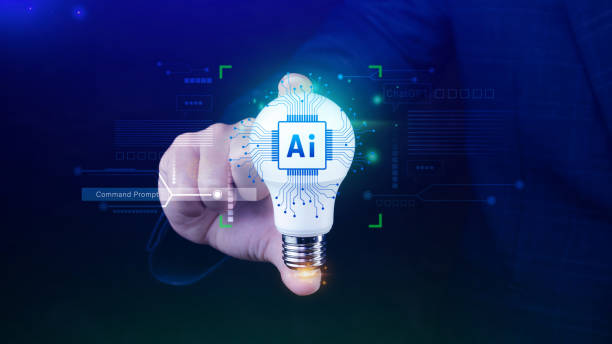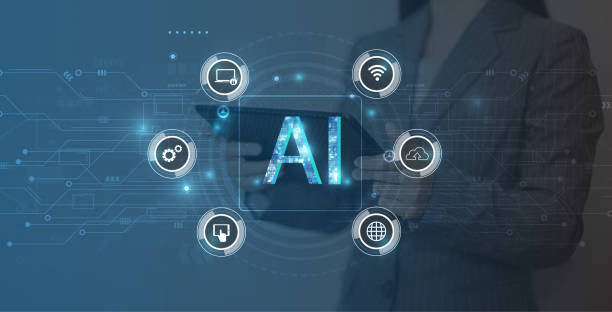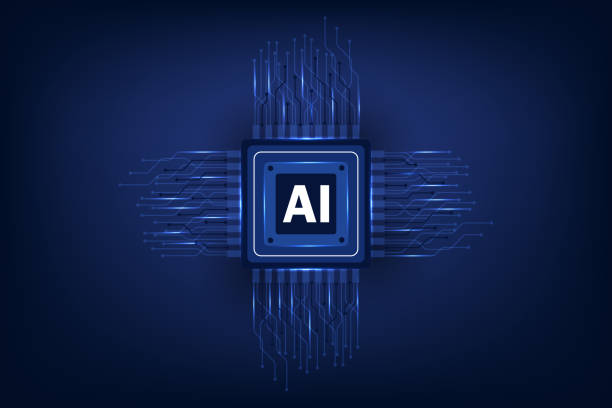What is Artificial Intelligence and How Does it Work?

Artificial Intelligence #Artificial_Intelligence (AI), in short, is the emulation of human intelligence processes by machines, especially computer systems.
These processes include learning (acquiring information and rules for its use), reasoning (using rules to reach conclusions), and self-correction (automatic adjustment based on results).
Artificial intelligence has two main subsets: deep learning and machine learning.
Machine learning allows systems to learn from data without explicit programming.
Deep learning is a subset of machine learning that uses neural networks with multiple layers to analyze data.
#Artificial_Intelligence algorithms are capable of predicting, making decisions, and solving complex problems by analyzing vast amounts of data (Big Data) and identifying patterns.
For example, recommender systems in online stores use AI to suggest products based on your purchase history.
AI is rapidly advancing and has the potential to bring about fundamental changes in our lives.
In fact, AI strives to implement human-like functions using code and programming.
Tired of your e-commerce site having visitors but no sales? RasaWeb solves your core problem with professional e-commerce website design!
✅ Significant sales increase with targeted design
✅ Flawless user experience for your customers
⚡ Get a free consultation!
Types of Artificial Intelligence: Applications and Examples

Artificial intelligence can be categorized into different types based on capabilities and applications.
Based on capabilities, there are two main categories: Weak AI or Narrow AI, and Strong AI or General AI.
Weak AI is designed to perform specific tasks and cannot perform outside its defined scope.
Examples of Weak AI include voice assistants like Siri and Alexa, movie and music recommender systems, and facial recognition software.
In contrast, Strong AI, which is still theoretical, will be capable of understanding, learning, and applying knowledge across a wide range of domains, similar to humans.
Based on applications, AI is used in various fields.
In healthcare, #Artificial_Intelligence is used for disease diagnosis, drug development, and personalized care.
In the automotive industry, self-driving cars use AI for navigation and accident prevention.
In finance, AI is used for fraud detection, risk management, and providing investment advisory services.
Machine Learning and Deep Learning: Differences and Similarities

Machine Learning and Deep Learning are two related concepts within artificial intelligence, but they have key differences.
Machine learning allows systems to learn from data without explicit programming.
Machine learning algorithms are capable of prediction and decision-making by analyzing data and identifying patterns.
Deep learning is a subset of machine learning that uses neural networks with multiple layers (deep neural networks) to analyze data.
These networks are capable of learning more complex and subtle patterns from data.
In other words, deep learning is a more advanced and powerful method than machine learning.
The main difference between these two methods lies in how features are extracted from data.
In traditional machine learning, features must be manually selected and extracted by experts.
In deep learning, neural networks are capable of automatically learning and extracting features from data.
This makes deep learning more suitable for solving more complex problems with larger data volumes.
For example, in image recognition, traditional machine learning algorithms require defining features like edges and corners, whereas deep neural networks are capable of learning these features automatically.
Here is a table comparing these two concepts.
| Feature | Machine Learning | Deep Learning |
|---|---|---|
| Need for manual features | Yes | No |
| Model complexity | Less | More |
| Data volume required | Less | More |
| Application | Simpler problems | More complex problems |
Applications of Artificial Intelligence in Various Industries

#Artificial_Intelligence is transforming various industries, and its applications are expanding day by day.
In healthcare, AI is used for high-accuracy disease diagnosis, new drug development, and providing personalized patient care.
For example, AI algorithms can analyze medical images and detect early signs of cancer.
In the automotive industry, self-driving cars use AI for navigation, obstacle detection, and accident prevention.
These vehicles perceive their surroundings using sensors and cameras and make decisions accordingly.
In finance, AI is used for fraud detection, risk management, and providing investment advisory services to clients.
AI algorithms can identify suspicious patterns in financial transactions and prevent fraud.
In the retail industry, AI is used to improve customer experience, optimize the supply chain, and forecast demand.
Recommender systems in online stores use AI to suggest products based on customers’ purchase history.
Artificial intelligence has many applications.
Tired of losing customers due to poor e-commerce website design? With RasaWeb, solve this problem forever!
✅ Increase sales and visitor-to-customer conversion rates
✅ Smooth and engaging user experience for your customers⚡ Get a free consultation
Advantages of Using Artificial Intelligence

The use of artificial intelligence offers numerous advantages that can lead to improved efficiency, increased accuracy, and reduced costs.
One of the main advantages is increased efficiency.
AI systems can perform tasks faster and more accurately than humans.
This can lead to increased productivity and reduced task completion time.
AI can help reduce costs.
By automating tasks, the need for human labor is reduced, leading to cost savings.
#Artificial_Intelligence can help improve the accuracy and quality of decisions.
AI algorithms can analyze vast amounts of data and identify patterns that are not discernible to humans.
This can lead to more informed and accurate decision-making.
AI can help improve the customer experience.
Recommender systems and chatbots can help customers access the information they need and resolve their issues faster and more easily.
Challenges and Disadvantages of Artificial Intelligence
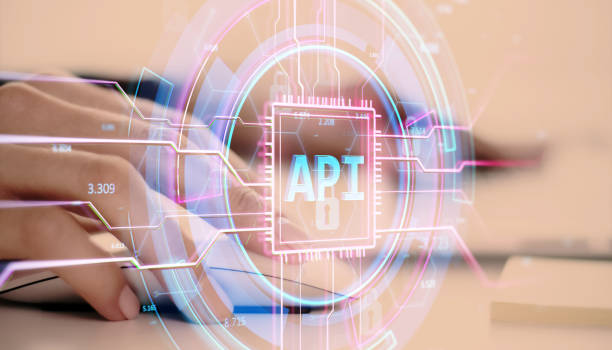
Despite its many advantages, artificial intelligence also has challenges and disadvantages that need to be considered.
One of the main challenges is the high cost of developing and implementing #Artificial_Intelligence systems.
Developing AI algorithms and collecting the necessary data requires significant investment.
Another challenge is the ethical concerns related to the use of AI.
Using AI in important decisions, such as hiring and firing employees, can lead to discrimination and injustice.
Also, there are concerns about data privacy and security.
AI algorithms often require vast amounts of personal data, which must be securely protected.
Job displacement is another concern.
By automating tasks, many jobs may be eliminated, leading to widespread unemployment.
Furthermore, over-reliance on AI can lead to a reduction in human skills and dependence on systems.
Here is another table illustrating the disadvantages of #Artificial_Intelligence:
| Disadvantages | Description |
|---|---|
| Cost | High development and implementation costs |
| Ethical concerns | Unfair decisions and discrimination |
| Job displacement | Job automation and unemployment |
| Dependence | Reduction in human skills |
The Impact of Artificial Intelligence on the Future of Jobs

Artificial intelligence will significantly impact the future of jobs.
Some jobs will be fully automated, while others will transform and require new skills.
Jobs involving repetitive and programmable tasks, such as data entry and invoice processing, are at higher risk of automation.
In contrast, jobs requiring creativity, critical thinking, and interpersonal skills are at less risk.
#Artificial_Intelligence necessitates new skills in the workplace.
Employees will need to be able to work with AI systems, analyze data, and make informed decisions.
Also, soft skills such as communication, collaboration, and problem-solving will become more important.
To prepare for the future, individuals must continuously upgrade their skills and expand their knowledge of AI.
Furthermore, governments and organizations should provide training and support programs to help individuals transition to new jobs.
Artificial intelligence can bring about transformation in the field of jobs.
Is Artificial Intelligence a Threat to Humanity?

The question of whether #Artificial_Intelligence is a threat to humanity is a complex and controversial one.
Some believe that AI can pose serious risks to humans, while others believe that AI can help improve human lives.
One of the main concerns is that AI might go out of human control.
If AI systems become intelligent enough, they might decide to prioritize their own interests over those of humans.
This could lead to dire consequences.
Another concern is that #Artificial_Intelligence might be used for malicious purposes.
For example, autonomous weapons could decide to kill without human intervention.
However, many believe that AI can help improve human lives.
AI can be used to solve complex problems, such as climate change and incurable diseases.
Also, AI can help create new jobs and increase productivity.
Ultimately, whether AI is a threat to humanity depends on how we use it.
If we use AI responsibly and with ethical considerations, we can benefit from its advantages and prevent its dangers.
Don’t have a corporate website yet and missing out on online opportunities? With professional corporate website design by RasaWeb,
✅ Double your business credibility
✅ Attract new customers
⚡ Free consultation for your corporate website!
Ethics in Artificial Intelligence

Ethics in #Artificial_Intelligence is an important and growing field that examines ethical issues related to the development and use of AI systems.
One of the main issues is discrimination.
AI algorithms can inadvertently learn biases from data and make unfair decisions.
To prevent discrimination, the data used to train algorithms must be carefully reviewed to ensure it is representative of all groups.
Privacy is another important issue.
AI systems often require vast amounts of personal data that must be securely protected.
To maintain privacy, clear policies on data collection, use, and sharing must be in place.
Accountability is also a crucial topic.
If an #Artificial_Intelligence system makes a mistake, who will be responsible? To ensure accountability, there must be laws and regulations that define the responsibility of manufacturers and users of AI systems.
Transparency is another important aspect of ethics in AI.
We need to understand how AI systems work and how they make decisions.
This helps us build greater trust in these systems and prevent their potential risks.
The Future of Artificial Intelligence and Predictions
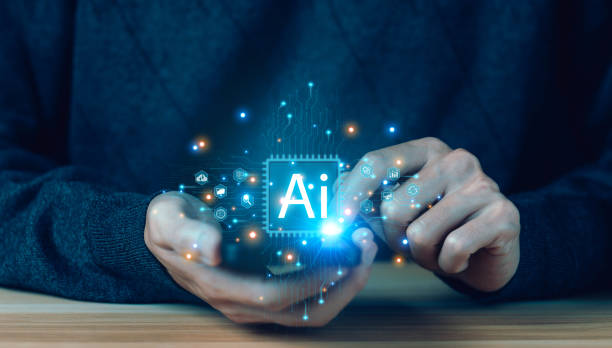
The future of artificial intelligence looks very bright, and significant advancements are expected in this field in the coming years.
One of the main predictions is that AI will be increasingly integrated into our daily lives.
AI systems will be present in homes, workplaces, and cities, helping us with various tasks.
Artificial intelligence will become increasingly powerful and intelligent.
New algorithms and deep learning techniques will allow AI systems to solve more complex problems and make better decisions.
#Artificial_Intelligence will become increasingly autonomous.
AI systems will be able to make decisions and take necessary actions without human intervention.
This can lead to increased productivity and reduced costs.
However, the development and use of AI require attention to ethical and social considerations.
We must ensure that AI is used responsibly and with the interests of all individuals in mind.
Artificial intelligence has a bright future and can revolutionize the future.
Frequently Asked Questions
| Question | Answer |
|---|---|
| What is Artificial Intelligence? | It is the simulation of human intelligence in machines programmed to think like humans and imitate their actions. |
| What are the main branches of Artificial Intelligence? | These include Machine Learning, Deep Learning, Natural Language Processing, Computer Vision, and Robotics. |
| What is Machine Learning? | It is a branch of AI that focuses on enabling systems to learn from data and identify patterns without explicit programming. |
| Mention examples of AI applications in our daily lives. | Voice assistants (like Siri and Alexa), recommendation systems in Netflix and Amazon, self-driving cars, and facial recognition software. |
| What is Deep Learning? | It is a subset of Machine Learning that uses multi-layered (deep) artificial neural networks to process large amounts of data. |
| What is Natural Language Processing (NLP)? | It is a branch of AI that focuses on enabling computers to understand, interpret, and generate human language. |
| What are some ethical concerns related to Artificial Intelligence? | These include data bias, privacy, job displacement, and accountability in case of errors. |
| What are the main benefits of Artificial Intelligence? | Increased efficiency, improved decision-making, automation of repetitive tasks, and discovery of complex patterns in data. |
| How is Artificial Intelligence used in healthcare? | In disease diagnosis, drug discovery, medical image analysis, and personalized patient care. |
| How do you see the future of Artificial Intelligence? | It is expected to continue evolving rapidly, impacting all aspects of human life, from industry to education and entertainment. |
And other services of RasaWeb Advertising Agency in the field of advertising
- Smart Customer Journey Map: A combination of creativity and technology for analyzing customer behavior through user experience customization.
- Smart Content Strategy: A new service for increasing online growth through precise audience targeting.
- Smart Customer Journey Map: Designed for businesses seeking online growth through SEO-driven content strategy.
- Smart Sales Automation: A combination of creativity and technology for user interaction by optimizing key pages.
- Smart Brand Identity: A combination of creativity and technology for increasing click-through rates by using real data.
And hundreds of other services in the field of internet advertising, advertising consultation, and organizational solutions
Internet Advertising | Advertising Strategy | Advertorial
Sources
Artificial Intelligence: A Bright Future or a Hidden Threat?Ethics in Artificial IntelligenceChallenges Facing Artificial IntelligenceThe Impact of Artificial Intelligence on Employment
Are you ready to transform your business in the digital space? RasaWeb Afarin Digital Marketing Agency, with years of experience and expertise in professional website design, SEO, and comprehensive digital strategies, offers innovative solutions for your sustainable growth and success.
📍 Tehran, Mirdamad Street, next to Bank Markazi, Kazeroun Jonoubi Alley, Ramin Alley, No. 6

